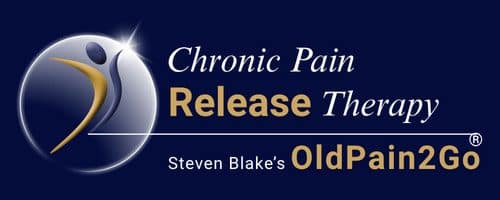
Prioritising the
Release of Pain
Advances in pain neuroscience show that chronic pain is not necessarily a sign of ongoing damage, but often a reflection of the brain’s protective systems working continuously to keep the individual safe.
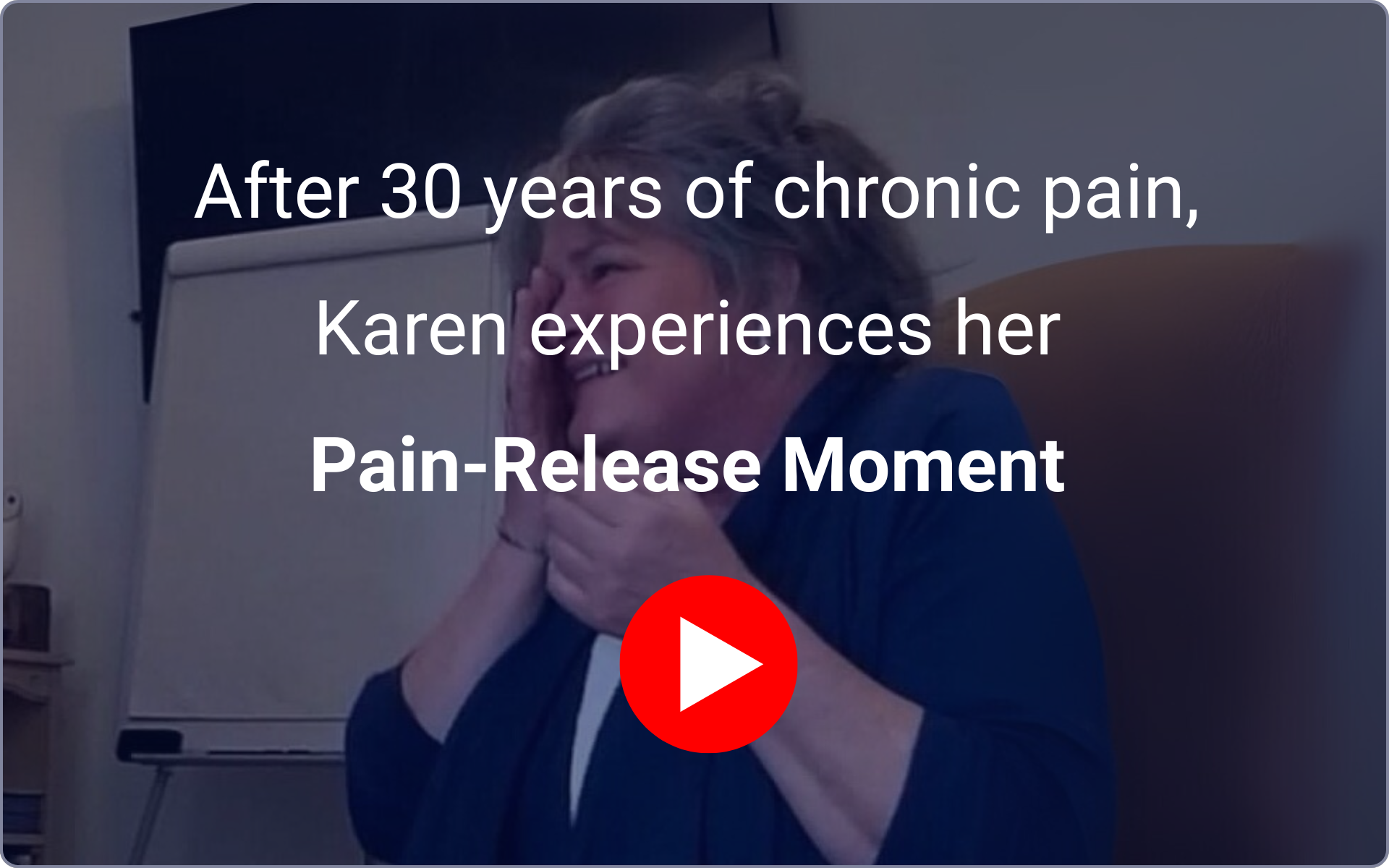
Integrating the the latest neuroscience insights, with subtle brain–body communication techniques, our approach directly engages the automatic processes that often operate beyond conscious awareness, harnessing the brain’s natural ability to re-evaluate and reset unnecessary protective responses. This frees individuals to move beyond the burden of pain management and support more effective recovery and rehabilitation once pain is no longer a limiting factor.
Supporting everyone touched by chronic pain.
Prioritising the Release of Pain
Chronic Pain Release Therapy, known worldwide as Steven Blake's OldPain2Go®, is an innovative, effective, and practical approach that helps individuals release long-term pain, predominantly within a single focused session.
Advances in pain neuroscience show that chronic pain is not necessarily a sign of ongoing damage, but often a reflection of the brain’s protective systems working continuously to keep the individual safe.

Integrating the latest neuroscience insights, with subtle brain–body communication techniques, our approach directly engages the automatic processes that often operate beyond conscious awareness, harnessing the brain’s natural ability to re-evaluate and reset unnecessary protective responses. This frees individuals to move beyond the burden of pain management and support more effective recovery and rehabilitation once pain is no longer a limiting factor.
Supporting everyone touched by chronic pain.
Prioritising the Release of Pain
Chronic Pain Release Therapy, known worldwide as Steven Blake's OldPain2Go®, is an innovative, effective, and practical approach that helps individuals release long-term pain, predominantly within a single focused session.
Advances in pain neuroscience show that chronic pain is not necessarily a sign of ongoing damage, but often a reflection of the brain’s protective systems working continuously to keep the individual safe.
Integrating the latest neuroscience insights, with subtle brain–body communication techniques, our approach directly engages the automatic processes that often operate beyond conscious awareness, harnessing the brain’s natural ability to re-evaluate and reset unnecessary protective responses. This frees individuals to move beyond the burden of pain management and support more effective recovery and rehabilitation once pain is no longer a limiting factor.
Supporting everyone touched by chronic pain.
Success Stories - Real People, Real Results
One of the most inspiring aspects of our work is sharing success stories from individuals and professionals around the world.
Affecting around 20% of the global population, chronic pain has reached epidemic levels. Thankfully, we are in the midst of a significant shift in pain science, reshaping how pain is understood, explained, and approached. This evolution offers long-awaited validation for those affected by chronic pain and, more importantly, opens meaningful pathways toward rapid recovery and renewed hope for millions.
Our intention is that by making the complexity of chronic pain understandable, sharing our innovative and logical perspective, and demonstrating the remarkable real-world results of our effective, direct approach, we offer more than understanding - we offer hope, clarity, and a practical pathway forward.
Thanks to advances in neuroscience, we now have a clearer understanding that pain is not simply a direct measure of injury, but the brain’s interpretation of signals it perceives as potentially harmful.
These signals arise from specialised sensory receptors within the body known as nociceptors, which detect the characteristics of potential damage, such as heat, pressure, or chemical changes.
Prioritising survival, the brain forms neural connections linked to potential harm, continuously re-evaluating these signals in light of past experiences, emotional state, expectations, and environmental context.
This adaptive system, shaped by a dynamic interplay of biological, psychological, and social influences, allows the brain to anticipate potential threats and trigger early protective responses that prompt behaviours designed to reduce the risk of injury. This broader perspective is often described as the biopsychosocial view of pain.
What's Driving The Pain Now?

When pain persists, fluctuates, or recurs beyond the expected healing period of three months, continues despite diagnosis or treatment, or where no clear damage is present, this strongly suggests a shift in the underlying pain mechanisms. Pain that may have begun with tissue damage (nociceptive pain) or nerve injury (neuropathic pain) can become sustained by altered processing within the brain and central nervous system, known as nociplastic pain.
In this state, the brain’s protective systems may remain active, triggering bodily responses such as muscle guarding, inflammation, and changes in nerve sensitivity. This can cause harmless stimuli to be interpreted as threatening, maintaining a cycle in which the brain’s protective predictions and the body’s responses reinforce each other, blurring the line between cause and effect.
While this helps explain why an individual can experience very real pain long after an injury has healed, or even when no clear tissue or nerve damage is present, this feedback loop, combined with the overlapping and coexisting nature of these mechanisms, can make it difficult for both individuals and professionals to pinpoint exactly what is driving the pain, particularly since the person’s perception is the only reliable way to measure it.
When pain becomes chronic, it is essential to consider all contributing factors, particularly the brain’s protective processing, which can maintain, amplify, or even generate the pain experience.
Thanks to advances in neuroscience, we now have a clearer understanding that pain is not simply a direct measure of injury, but the brain’s interpretation of signals it perceives as potentially harmful.
These signals arise from specialised sensory receptors within the body known as nociceptors, which detect the characteristics of potential damage, such as heat, pressure, or chemical changes.
Prioritising survival, the brain forms neural connections linked to potential harm, continuously re-evaluating these signals in light of past experiences, emotional state, expectations, and environmental context.
This adaptive system, shaped by a dynamic interplay of biological, psychological, and social influences, allows the brain to anticipate potential threats and trigger early protective responses that prompt behaviours designed to reduce the risk of injury. This broader perspective is often described as the biopsychosocial view of pain.
What's Driving The Pain Now?

When pain persists, fluctuates, or recurs beyond the expected healing period of three months, continues despite diagnosis or treatment, or where no clear damage is present, this strongly suggests a shift in the underlying pain mechanisms. Pain that may have begun with tissue damage (nociceptive pain) or nerve injury (neuropathic pain) can become sustained by altered processing within the brain and central nervous system, known as nociplastic pain.
In this state, the brain’s protective systems may remain active, triggering bodily responses such as muscle guarding, inflammation, and changes in nerve sensitivity. This can cause harmless stimuli to be interpreted as threatening, maintaining a cycle in which the brain’s protective predictions and the body’s responses reinforce each other, blurring the line between cause and effect.
While this helps explain why an individual can experience very real pain long after an injury has healed, or even when no clear tissue or nerve damage is present, this feedback loop, combined with the overlapping and coexisting nature of these mechanisms, can make it difficult for both individuals and professionals to pinpoint exactly what is driving the pain, particularly since the person’s perception is the only reliable way to measure it.
When pain becomes chronic, it is essential to consider all contributing factors, particularly the brain’s protective processing, which can maintain, amplify, or even generate the pain experience.
We Are Living in a Pivotal Time of Change for Chronic Pain
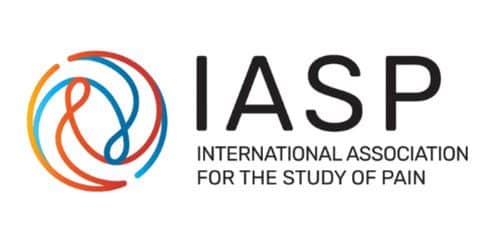

Thanks to the leadership of the International Association for the Study of Pain (IASP) and collaboration with the World Health Organisation (WHO), these recent scientific insights are now being formally recognised, marking two historic milestones:

2020: Updated definition of pain — For the first time since 1979, the IASP revised the definition of pain. The subtle yet important addition of the word “resembling” reflects that pain can exist even without tissue damage. This change acknowledges the brain’s role in generating pain, ensuring that individuals with chronic pain are understood and validated, even when tests or scans show no clear injury.
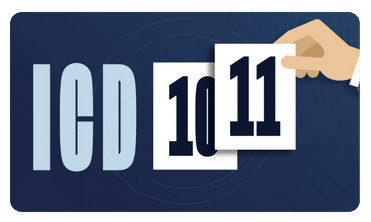
2022: First dedicated classifications of chronic pain — The International Classification of Diseases, 11th revision (ICD-11), introduced the first globally recognised framework for chronic pain. This allows healthcare professionals to recognise, describe, and respond to chronic pain as a distinct condition, rather than just a symptom. A key feature is Chronic Primary Pain, which highlights pain maintained by changes in the central nervous system rather than ongoing tissue damage.
Chronic Widespread Pain
Diffuse pain in at least four of five body regions, often associated with conditions like fibromyalgia.
Complex Regional Pain Syndrome (CPRS)
A condition characterized by prolonged pain and changes in skin colour, temperature, and/or swelling in a limb, often following an injury.
Complex Primary Visceral Pain
Pain localised in the thoracic, abdominal, or pelvic region, often associated with significant emotional distress or functional disability.
Chronic Primary Musculoskeletal Pain
Pain in muscles, bones, joints, or tendons, often associated with low back, cervical, thoracic and limb pain.
Chronic Primary Headache or Orofacial Pain
Includes chronic migraine, chronic tension-type headache, trigeminal autonomic cephalalgias, and other primary headache or orofacial pain syndromes.
Chronic Primary Specified & Unspecified Pain.
This category includes syndromes recognised as primary that do not fit into the standard categories, as well as cases where the type or location of pain is not specified.
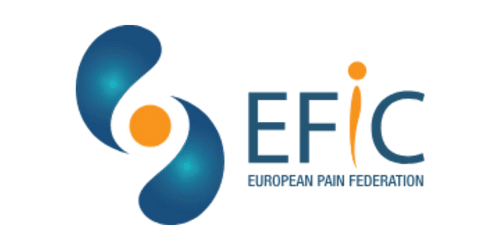
To learn more about Chronic Primary, including the importance of ruling out other causes, visit the European Pain Federation’s website.
These recent breakthroughs in pain science have helped people move beyond outdated beliefs, recognising that pain isn't simply something happening in the body, nor is it 'all in the head.'
Rather, pain is a very real and meaningful protective alert generated by the brain, felt in the body and shaped by a complex interplay of biological, psychological, and social factors.
The Coming Years Are Vital for Closing the Gap Between Emerging Scientific Insights and Everyday Practice
While some countries have already begun transitioning from ICD-10 to ICD-11, full global adoption is expected by around 2026. This gradual shift reflects the complexity of implementing such a significant update across diverse healthcare systems worldwide. It underscores that we are living through a truly significant moment in pain science, one that recognises and supports approaches addressing the true drivers of chronic pain, enabling more effective and compassionate care.
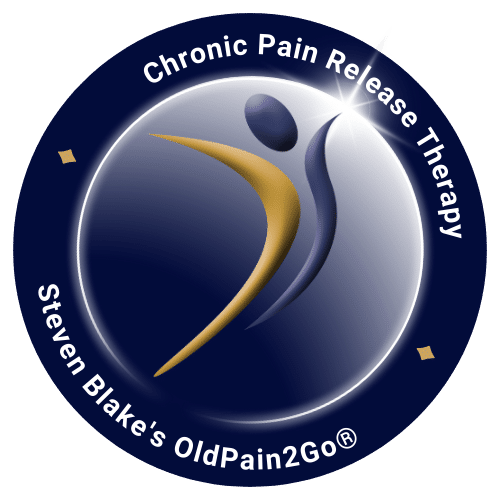
Our Innovative, Logical Perspective and Effective, Direct, Practical Approach
Many models describe chronic pain as maladaptive, oversensitive, or misfiring. While such descriptions are often well-intended and aim to explain the complexity of pain, when used without exploring the individual’s unique circumstances, they can unintentionally imply that something within them is malfunctioning. This can heighten the brain’s sense of threat, amplify the pain experience, lead to disregarding the pain’s message, and, perhaps more significantly, create the impression that recovery must be slow or out of reach.
We See Things Through A Different Lens
Our approach focuses on the brain’s protective role in pain, recognising that once pain becomes chronic, it is not necessarily a sign of ongoing damage. Instead, it often reflects the brain’s protective systems working continuously to keep the individual safe
We believe that, from the brain's perspective, all pain serves a purpose: to signal that it still perceives a need for protection. What makes our approach unique is that we do not view chronic pain as a malfunction to be managed, but as a meaningful message to be Revealed, Resolved, Reset, and Released.
Our approach centres on helping the brain recognise when that level of protection is no longer required, allowing the body to heal and restore its natural balance. It is this insight that has been a turning point for many and forms a key foundation at the heart of our approach.
Reveal ~ Resolve ~ Reset
Our Highly Effective Three-Phase Process
By combining our innovative, logical perspective with subtle brain–body communication techniques that directly engage the automatic processes which often operate beyond conscious awareness, we help individuals understand why protection responses persist, and guide the brain to re-evaluate the level of threat in light of the current circumstances. This allows the system to complete its learning and stand down from unnecessary protection.
Put Simply, It’s about helping the brain update its own internal understanding on a deep level, through a form of communication it inherently speaks, essentially guiding it to recognise that protective responses are no longer needed, supporting the brain to reset its processing.
While approaches such as education, movement, and desensitisation work to gradually help the brain re-evaluate how it interprets signals, our approach harnesses the brain’s ability to form new neural connections (neuroplasticity) in a more direct route. By prioritising the release of long-term pain, individuals are freed from the ongoing burden of managing it, removing a major barrier and allowing other recovery and rehabilitation strategies to work with greater ease, clarity, and effectiveness.
Just as pain can be triggered in an instant, it can also be reset just as quickly when the brain reassesses signals and no longer perceives a need for protection.
By harnessing the brain’s natural capacity for re-evaluation in this way, we can help it update 'old' interpretations of harm, gently recalibrate predictive processing, and reset unnecessary protective responses - helping individuals achieve significant pain reduction, or complete release. This process is carefully designed to support lasting neuroplastic change by combining new insights, experiential shifts, and subtle neurological responses — all within a single, focused session.
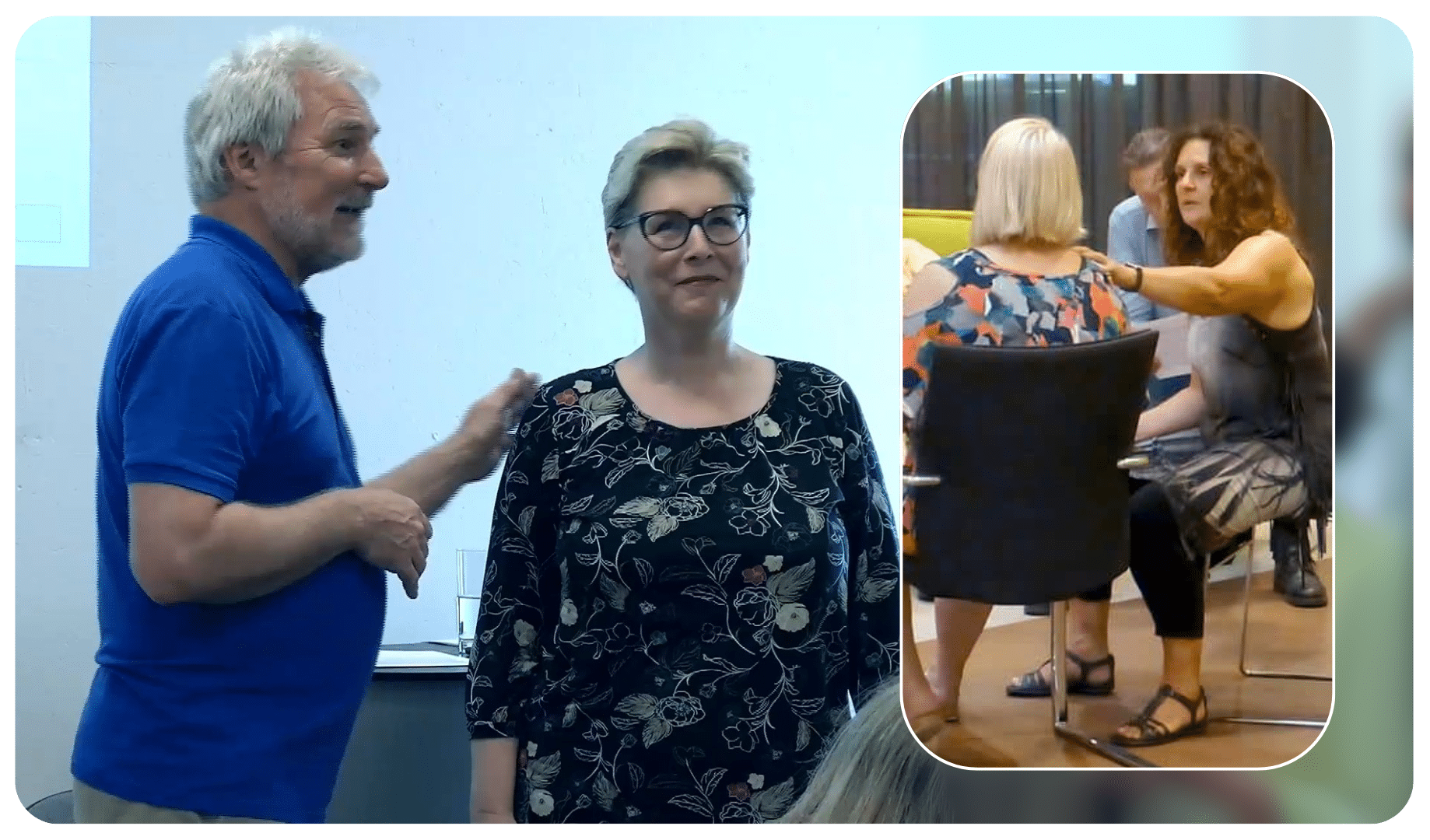
OldPain2Go® is a gentle, collaborative process, not something done to you, but with you. You remain fully in control throughout. There’s no need to relive trauma, revisit physical events, or enter a trance state. It is this integration of science, logic, and human connection, delivered through a single-session focus, that underpins the consistent, transformative results reported by practitioners around the world.
Demonstrating Remarkable Results
Proven effective in real-world applications, fuelled by countless success stories, supported by university-led research, and further validated by an observational study of 207 individuals demonstrating a remarkable 76% efficacy* in completely releasing long-term pain within a single focused session.
Demonstrating Remarkable Results
Proven effective in real-world applications, fuelled by countless success stories, supported by university-led research, and further validated by an observational study of 207 individuals demonstrating a remarkable 76% efficacy* in completely releasing long-term pain within a single focused session.
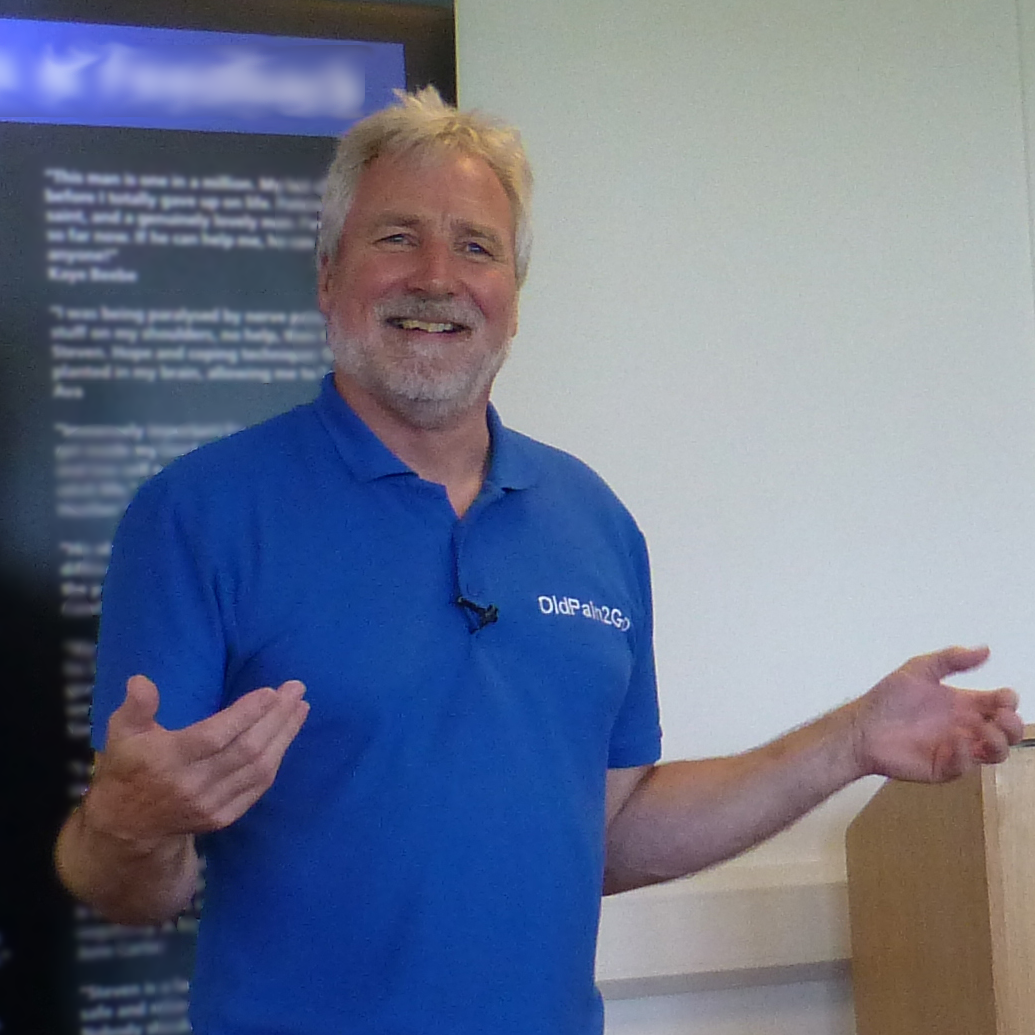
"
'Rapid Recovery becomes possible when understanding meets the brain's own mechanisms for change'
Steven Blake MBA
Founder, Creator, and Master Trainer of OldPain2Go® Chronic Pain Release Therapy
By prioritising the release of pain rather than merely managing it, our practical, science-aligned approach offers both individuals affected by chronic pain and the professionals supporting them a powerful, non-invasive pathway that requires no physical manipulation, can be delivered in person or online, and enhances other recovery strategies to achieve faster, more effective results.
"What began as my personal journey to overcome five decades of chronic pain has grown into something far bigger, a practical, compassionate approach now helping thousands of people worldwide break free from long-term pain."
"What began as my personal journey to overcome five decades of chronic pain has grown into something far bigger, a practical, compassionate approach now helping thousands of people worldwide break free from long-term pain."
Explore Steven's incredible journey of overcoming decades of chronic pain to creating an approach that is globally recognised to transforms lives. His story is one of curiosity, courage, and compassion, a reminder that progress begins with an open mind.
Steven encourages both individuals and practitioners to adopt a “give it a go” attitude. Even if it sounds almost too good to be true, the evidence continues to grow, demonstrating remarkable results of rapid recovery.
For practitioners, this is an invitation to stand at the forefront of an evolving field, one that aligns with emerging pain science and offers a practical approach to help others achieve lasting relief.
By remaining open, inquisitive, and willing to explore what’s possible, we can together reshape how the world understands and addresses long-term pain.
Living with persistent pain can feel overwhelming, exhausting, and lonely. Please know you are not alone. Understanding, support, and hope are here for you whenever you are ready.
If you are experiencing pain that persists, fluctuates, or recurs beyond three months, please know you are not alone, and there is hope.
You may wish to explore a session if you are experiencing pain that persists, fluctuates, or recurs beyond the expected healing period of three months, continues despite diagnosis or treatment, or exists even when no clear damage is present.
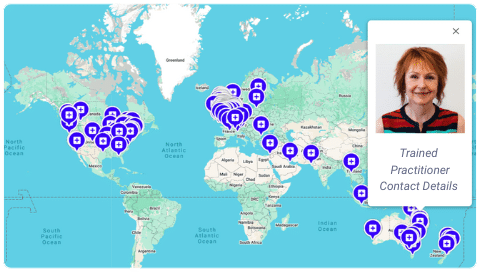
We understand you’ve likely invested significant time, energy, and resources in seeking relief, often with limited results. While no approach can guarantee outcomes for everyone, we warmly invite you to explore this practical, non-medical approach that is helping countless individuals worldwide release their pain.
Our training has reached over 1,800 practitioners across the world, including doctors, nurses, physiotherapists, psychologists, neurologists, pain researchers, hypnotherapists, NLP practitioners, and a broad range of wellbeing professionals
Our training has reached over 1,800 practitioners across the world, including doctors, nurses, physiotherapists, psychologists, neurologists, pain researchers, hypnotherapists, NLP practitioners, and a broad range of wellbeing professionals
Transforming the complexity of chronic pain into simple, practical skills, that can be seamlessly integrated.
This means you can start learning at your own pace today, then book your live online session when you're ready, giving you the flexibility to become fully certified on your own schedule.
We are all on a journey to understand pain more deeply and to close the gap between emerging scientific insights and everyday practice.
We are all on a journey to understand pain more deeply and to close the gap between emerging scientific insights and everyday practice.
We are committed to continuous evolution and believe that collaboration is key to progress in this rapidly advancing field, an outlook reinforced by university-led research and a large-scale observational study, which highlight the broad applicability and transformative potential of our approach in addressing persistent pain.
Through collaborations with pain organisations, researchers, and scientific communities, we aim to deepen the understanding of pain release achieved through this innovative and effective method, ensuring that advancements in pain science translate into accessible solutions for those in need.
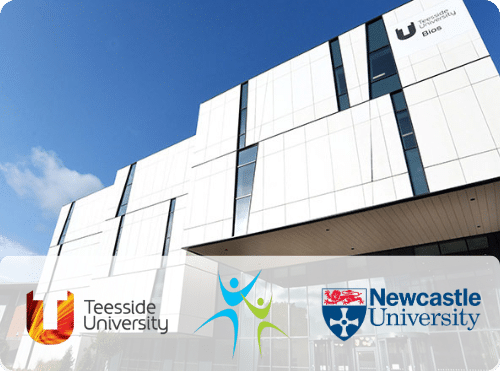
We're inspired by The Recent Advancements

Pictured: Founder, Creator, and Master Trainer of OldPain2Go® Steven Blake, alongside Business Development Manager, Peter Dennis, at the 2024 IASP World Congress, which celebrated fifty years of progress in pain science.
We're inspired by The Recent Advancements
It is encouraging to see emerging insights recognised at the highest levels, from updated international definitions and new diagnostic classifications, to public education campaigns, and even parliamentary discussions on prevention and recovery.
We envision a future where research, collaboration, and innovative approaches like ours are fully embraced, ensuring every individual has access to effective care and compassionate guidance toward lasting relief.
We invite forward-thinking professionals to explore how this approach can compliment your practice, whether through research, training, referral pathways, or endorsement alongside medical and management-based options.
We invite forward-thinking professionals to explore how this approach can compliment your practice, whether through research, training, referral pathways, or endorsement alongside medical and management-based options.
Let’s work together to help people worldwide - bridging science, compassion, and real-world solutions.
Whether you’re affected by chronic pain and seeking personal relief, supporting others as a healthcare or wellbeing professional, or advancing research and innovation in pain science - we warmly invite you to explore a practical approach that is showing remarkable results in helping countless individuals worldwide release their pain.

Frequently Asked Questions
You may wish to explore a session if you are experiencing pain that persists, fluctuates, or recurs beyond the expected healing period of three months, continues despite diagnosis or treatment, or exists even when no clear damage is present.
OldPain2Go® is a gentle, collaborative process. Sessions are conducted with you, not to you, and you remain fully in control at all times. There’s no need to relive trauma, revisit physical events, or enter a trance state. The approach combines science, logic, and human connection, delivered through a focused, single-session framework. This structure supports the nervous system in recognising that the pain is no longer needed, helping individuals experience meaningful and often transformative relief.
Pain management, medication, and medical interventions often focus on controlling symptoms or addressing the immediate, foreground hurt. OldPain2Go® works differently, it directly engages the brain’s learned patterns and predictive mechanisms that often sustain chronic pain, addressing the root cause or background harm.
By combining a logical, science-informed perspective with subtle brain–body communication techniques, OldPain2Go® engages automatic processes that often operate beyond conscious awareness. This helps individuals understand why protective responses persist and guides the brain to re-evaluate the level of threat in light of current circumstances. In doing so, the nervous system can complete its learning and stand down from unnecessary protection, allowing long-term pain to be released safely.
OldPain2Go® began independently with Steven in 2011, before he was aware of these pioneers’ work.
While the approach has distinct differences, we hold great respect for the contributions of these researchers, whose work has shown that long-term pain is often a protective brain response rather than a sign of ongoing tissue damage, and highlighting that the same neural pathways process both the sensory and emotional aspects of pain.
Steven created OldPain2Go® based on a simple, logical principle: pain holds a message the brain is trying to communicate. When this message is understood and addressed, the process completes and the system resets, suggesting that chronic pain does not always signal damage, but may reflect an incomplete protective process. By combining this insight with his expertise in other therapeutic models, Steven developed a unique approach that helps people affected by pain while training professionals to deliver relief worldwide.
Where OldPain2Go® stands out is its innovative, logical perspective and effective, direct practical approach.
Many models describe chronic pain as maladaptive, oversensitive, or misfiring. While such descriptions are often well-intended and aim to explain the complexity of pain, when used without exploring the individual’s unique circumstances, they can unintentionally imply that something within them is malfunctioning. This can heighten the brain’s sense of threat, amplify the pain experience, lead to disregarding the pain’s message, and, perhaps more significantly, create the impression that recovery must be slow or out of reach.
We believe that, from the brain's perspective, all pain serves a purpose: to signal that it still perceives a need for protection. What makes our approach unique is that we do not view chronic pain as a malfunction to be managed, but as a meaningful message to be Revealed, Resolved, Reset, and Released.
Rather than gradually re-training the brain, OldPain2Go® integrates the latest neuroscience insights, with subtle brain–body communication techniques to directly engage the automatic processes that often operate beyond conscious awareness. This harnesses the brain’s natural ability to re-evaluate and reset unnecessary protective responses, predominantly within a single focused session, prioritising the release of pain and allowing other recovery and rehabilitation strategies to work with greater ease, clarity, and effectiveness. This focus on rapid, purposeful relief has made a remarkable difference for thousands of individuals and forms a cornerstone of our methodology that is taught to medical and wellbeing professionals globally.
Steven’s message through OldPain2Go® is simple: when pain becomes chronic, it suggests that it is not necessarily damage, and it is vital to consider the brain’s role. He warmly encourages people to explore the remarkable results witnessed by practitioners worldwide, share in the insights, and invites individuals to see how this approach can make a real difference in their lives.
Cognitive Behavioural Therapy and OldPain2Go® both support individuals living with long-term pain, yet they approach the experience from different angles. CBT is designed to help a person understand how thoughts, emotions, and behaviours influence their pain, often teaching practical skills for managing stress, reframing unhelpful beliefs, and building resilience over time. It is a structured psychological therapy that supports someone in navigating the pain experience more effectively, much like learning to steer more confidently through changing weather.
OldPain2Go® works differently. Instead of focusing primarily on coping strategies or shifting thoughts, it engages directly with the brain’s predictive mechanisms and protective patterns that can sustain chronic pain. Where CBT helps shape the person’s relationship with pain, OldPain2Go® aims to help the system stand down from unnecessary protection altogether. Both approaches respect the science of neuroplasticity and the biopsychosocial nature of pain, and many professionals see them as complimentary rather than competing.
Together, they offer a broader landscape of support: CBT helps someone develop clarity and confidence in how they navigate their world, while OldPain2Go® invites the brain to complete an outdated protective process and move towards relief.
Parts Therapy is a therapeutic approach that involves identifying and working with different ‘parts’ of a person’s psyche, often rooted in Internal Family Systems or similar models. It focuses on resolving conflicts or trauma by helping these parts work together more harmoniously.
In contrast, OldPain2Go® focuses on updating the brain’s perception of pain. Rather than exploring internal parts, it addresses the brain’s predictive mechanisms and learned patterns that maintain chronic pain. The goal is to help the brain recognise that the pain is no longer needed, allowing the nervous system to reset and release long-term pain, without necessarily delving into internal psychological parts.
Hypnotherapy typically involves guiding someone into a deeply relaxed state, often called a trance, to access the subconscious mind. In this state, the therapist may help the individual reframe or resolve issues, including pain, by suggesting positive changes or new perspectives.
OldPain2Go®, however, does not rely on a trance state, it focuses on helping the brain recognise that the pain is no longer needed through subtle brain–body communication techniques that directly engage the automatic processes which often operate beyond conscious awareness. By harnessing the brain’s natural capacity for re-evaluation in this way, we can help it update 'old' interpretations of harm, gently recalibrate predictive processing, and reset unnecessary protective responses - helping individuals achieve significant pain reduction, or complete release.
Many practitioners trained with the Barral Institute find that OldPain2Go® works seamlessly alongside their hands-on skills. Both approaches respect the body’s intelligence and the brain’s role in regulating protection and pain. The Barral Institute’s work uses precise manual techniques to ease restrictions and support natural regulation.
OldPain2Go® complements this by helping the brain reassess long-term protective patterns that may continue even after tissues have healed. Through calm dialogue and clear explanation, individuals are guided to understand the purpose behind persistent pain and, when appropriate, to update that response.
At present, most of the research on OldPain2Go®’s consists of short-term observational data, university-led research and practitioner-reported outcomes, which already show remarkable results, predominantly within a single focused session. Because our approach focuses on resolving pain at its root rather than managing it continuously, the need for traditional long-term follow-up is less critical. In many cases, once the pain is released, it does not return, meaning that the effects are lasting and there is nothing further to manage.
That said, we recognise the importance of rigorous research to support wider adoption and understanding. Ongoing studies and future collaborations with researchers aim to formally document outcomes over months and years, contributing to the scientific evidence base. In the meantime, extensive practitioner experience and numerous case reports provide strong real-world evidence of the therapy’s sustained impact, offering reassurance to both practitioners and individuals seeking lasting relief.
Have a question that isn't covered here?
Our mission is to help individuals understand and release long-term pain, guided by science, compassion, and practical tools. Every question matters, and every conversation is an opportunity to make a meaningful difference. We warmly invite you to get in touch using the contact details in the Get In Touch section below, whether to learn more, ask a question, or explore how our approach might support you or those you care for. We are here to listen and guide with clarity and care.












